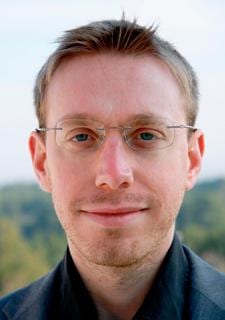Daniel Tammet may be the most intelligent gay man alive today. An autistic savant, he’s recited 22,514 digits of the infinite number pi from memory, speaks 11 languages and learned Icelandic in a week after accepting the challenge as part of the documentary Brainman.
But what’s remarkable about Tammet is that, in addition to having a brilliant and fascinating mind, he is able to articulate much of how his thinking works.
“This associative thinking, making unusual associations… is not rare, it might be the rule of how autistic people think,” says Tammet from his home in Avignon, France. “There are as many types of autism as there are people who have the condition.”
In his 2007 autobiography, Born on a Blue Day, Tammet details his understandings of the world, such as experiencing numbers as having colours, shapes and personalities. His new book, Embracing the Wide Sky, is an exploration of autism and savant syndrome itself, including his insights on the nature of intelligence and the potential for the human mind — even yours.
But while understanding numbers and languages came easy to Tammet, learning the nuances of social interaction was a struggle, as it is for many people with autism. The significance and importance of eye contact and body language were foreign to Tammet and he attributes the patience of his first partner, Neil, to helping him to develop the ability to love and share.
“No doubt that the relationship with my partner was very important,” says Tammet. “He supported me, nurtured me, and I pay tribute to that first relationship in my first book.”
Tammet, 30, says that although he was very aware of being different early on, being gay wasn’t an issue for him. “For me being gay was natural, I never had any anguish,” he says. “I’m not so conscious of social conventions.
“I had a crush when I was 16 — another boy in the college — feeling very strange, having butterflies in my stomach, being unable to communicate. I wrote a letter and gave it to him one day — I’ve been very lucky, he politely declined.”
Tammet says he thinks it’s possible that gay brains are wired differently than straight folks’, citing as an example a study that found gay men and straight men read maps differently.
“I have no problem believing that the gay mind is different,” he says. “That’s the whole point of [Embracing the Wide Sky], that every mind has something unique and beautiful to contribute to society.”
It’s estimated that autism affects between four and 10 out of every 10,000 births, but fewer than 50 autistic adults in the world are capable of the seemingly miraculous abilities that go with the savant label, such as performing mathematical gymnastics or noticing and remembering minutiae.
“Autism does facilitate certain kinds of thinking that can lead to great creative insights,” says Tammet, citing autistic poets who make unusual connections — a phenomenon he refers to as “hyperconnectivity” — where the brain cells make many links to other brain cells and thereby increase intelligence.
Tammet’s capacity for acute observation has led him to develop new methods for learning languages, including online language courses through his company Optimnem.
“There is a logic behind the words,” claims Tammet. For example, “Almost every word in English that starts with ‘sl’ is negative: slow, slimy, slug. These patterns exist across languages.
“Education does a poor job of instilling a sense of pleasure and curiosity in children. People have an instinct of numbers. Children have an intuitive way of relating to numbers, but lose them. But the brain is plastic.”
The savant phenomenon raises the issue of what exactly is intelligence and, perhaps more importantly, what is useful intelligence.
“If you’re born autistic, like I am, you have a chance where you can learn social skills. People are fundamentally free. If someone has a low IQ, we can teach them. The brain can change, it can adapt. It can grow new connections.
“It’s a very positive finding. It explains why someone like myself can learn social skills, learning how to look people in the eye, make friends, fall in love. It suggests people can learn skills by themselves: learning a language, learning to use numbers in a different way, a capacity for joy, peace or connection. We can practice our happiness, like a skill that can be strengthened with training.”
Embracing the Wide Sky has a Canadian connection — he wrote it in Canada while visiting his current partner, Jerome.
“We met in New York. He has a background in art, he’s interested in optical illusions.
“Canada is very close to our hearts. Our first months living together were in Quebec. Subsequently we moved to Europe. Jerome is very patient and accommodating.”

 Why you can trust Xtra
Why you can trust Xtra


